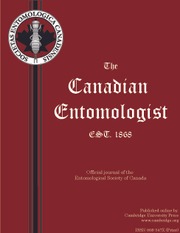Crossref Citations
This article has been cited by the following publications. This list is generated based on data provided by
Crossref.
Sanford, K. H.
and
Lord, F. T.
1962.
The Influence of Spray Programs on the Fauna of Apple Orchards in Nova Scotia. XIII. Effects of Perthane on Predators.
The Canadian Entomologist,
Vol. 94,
Issue. 9,
p.
928.
Lord, F. T.
1965.
Sampling Predator Populations on Apple Trees in Nova Scotia.
The Canadian Entomologist,
Vol. 97,
Issue. 3,
p.
287.
Jaques, R. P.
1965.
The Effect ofBacillus thuringiensisBerliner on the Fauna of an Apple Orchard.
The Canadian Entomologist,
Vol. 97,
Issue. 8,
p.
795.
Herne, D. H. C.
and
Putman, W. L.
1966.
Toxicity of Some Pesticides to Predacious Arthropods in Ontario Peach Orchards.
The Canadian Entomologist,
Vol. 98,
Issue. 9,
p.
936.
Sanford, K. H.
and
Herbert, H. J.
1966.
The Influence of Spray Programs on the Fauna of Apple Orchards in Nova Scotia. XV. Chemical Controls for Winter Moth, Operophtera brumata (L.), and Their Effects on Phytophagous Mite and Predator Populations.
The Canadian Entomologist,
Vol. 98,
Issue. 9,
p.
991.
Sanford, K. H.
1967.
THE INFLUENCE OF SPRAY PROGRAMS ON THE FAUNA OF APPLE ORCHARDS IN NOVA SCOTIA: XVII. EFFECTS ON SOME PREDACIOUS MITES.
The Canadian Entomologist,
Vol. 99,
Issue. 2,
p.
197.
Sanford, K. H.
and
Herbert, H. J.
1967.
THE INFLUENCE OF SPRAY PROGRAMS ON THE FAUNA OF APPLE ORCHARDS IN NOVA SCOTIA: XVIII. PREDATOR AND PREY POPULATIONS IN RELATION TO MITICIDES.
The Canadian Entomologist,
Vol. 99,
Issue. 7,
p.
689.
McMullen, R. D.
and
Jong, C.
1967.
THE INFLUENCE OF THREE INSECTICIDES ON PREDATION OF THE PEAR PSYLLA, PSYLLA PYRICOLA.
The Canadian Entomologist,
Vol. 99,
Issue. 12,
p.
1292.
Parent, B.
1967.
POPULATION STUDIES OF PHYTOPHAGOUS MITES AND PREDATORS ON APPLE IN SOUTHWESTERN QUEBEC.
The Canadian Entomologist,
Vol. 99,
Issue. 7,
p.
771.
Ulrich, H.
1968.
Versuche über die Empfindlichkeit vonTrichogramma (Hymenoptera, Chalcidoidea) gegenüber Fungiziden.
Anzeiger für Schädlingskunde,
Vol. 41,
Issue. 7,
p.
101.
BINNS, E. S.
BOCION, P.
and
GOULD, H. J.
1971.
The integration of chemical control of the melon aphid with predatory control of glasshouse red spider mite on cucumbers.
Annals of Applied Biology,
Vol. 68,
Issue. 1,
p.
1.
Hoyt, S. C.
and
Caltagirone, L. E.
1971.
Biological Control.
p.
395.
Hoyt, S. C.
and
Caltagirone, L. E.
1971.
Biological Control.
p.
395.
MacLellan, C. R.
1973.
NATURAL ENEMIES OF THE LIGHT BROWN APPLE MOTH, EPIPHYAS POSTVITTANA, IN THE AUSTRALIAN CAPITAL TERRITORY.
The Canadian Entomologist,
Vol. 105,
Issue. 5,
p.
681.
Delattre, P.
1974.
Étude de l'efficacité prédatrice deZetzellia mali [Acarina, Stigmaeidae] vis-a-vis du Tétranyque du Pommier,Panonychus ulmi [Acarina, Tetranychidae].
Entomophaga,
Vol. 19,
Issue. 1,
p.
13.
Kobylecki, Ryszard J.
and
Mckillop, Alexander
1976.
Advances in Heterocyclic Chemistry Volume 19.
Vol. 19,
Issue. ,
p.
215.
Croft, B. A.
1976.
Establishing insecticide-resistant phytoseiid mite predators in deciduous tree fruit orchards.
Entomophaga,
Vol. 21,
Issue. 4,
p.
383.
1978.
Chemistry of Heterocyclic Compounds.
Vol. 33,
Issue. ,
p.
165.
MacLellan, C. R.
1979.
PEST DAMAGE AND INSECT FAUNA OF NOVA SCOTIA APPLE ORCHARDS: 1953–1977.
The Canadian Entomologist,
Vol. 111,
Issue. 9,
p.
985.
Kelton, Leonard A.
1982.
DESCRIPTION OF A NEW SPECIES OF PLAGIOGNATHUS FIEBER, AND ADDITIONAL RECORDS OF EUROPEAN PSALLUS SALICELLUS IN THE NEARCTIC REGION (HETEROPTERA: MIRIDAE).
The Canadian Entomologist,
Vol. 114,
Issue. 2,
p.
169.

